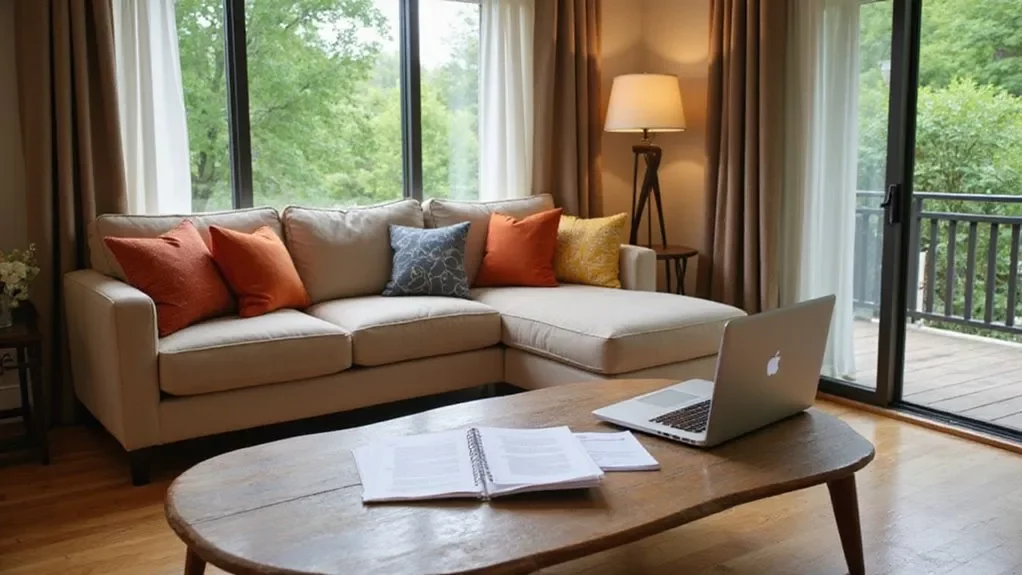Many homeowners with mortgages feel trapped when they need to sell but can’t find traditional buyers. Navigating a rent-to-own sale with an existing mortgage creates legal and financial complications that could jeopardize your property rights. Lenders may activate due-on-sale clauses, creating immediate financial pressure. However, with proper preparation and documentation, this alternative selling strategy can benefit both parties.
Yes, you can sell your house rent-to-own even with a mortgage, but you must obtain lender permission first. Your mortgage agreement likely contains a due-on-sale clause requiring full loan repayment when transferring property interest, so written approval is essential.
In this blog I will explore everything about selling mortgaged homes through rent-to-own agreements and protecting your interests.
Key Takeaways
- Selling a mortgaged home rent-to-own requires lender approval and full disclosure of existing mortgage terms.
- Due-on-sale clauses may require full mortgage repayment upon transfer, needing legal review.
- You must comply with Kentucky laws and properly document all rent credits, option fees, and payments.
- Establish escrow accounts and clear payment structures to protect both seller and buyer interests.
- Consult a real estate attorney and tax professional to ensure legal compliance and optimize financial benefits.
What is Rent-to-Own and How Does it Work?

Understanding rent-to-own agreements is key for maximizing your investment, as they combine leasing with an option to buy at a set price.
You should carefully evaluate option fees and rent premiums, which impact your upfront costs and monthly cash flow.
Clear timelines and price structures are essential to negotiate terms that align with your financial goals and minimize legal risks.
Understanding Rent-to-Own Agreements
Rent-to-own agreements combine leasing with a future purchase option. This arrangement lets you live in a home while working toward ownership. You pay normal rent plus extra money that goes toward your purchase.
Two main contract types exist: lease-option agreements and lease-purchase contracts. The key components include an option fee, rent premiums, purchase price, and lease duration. These elements determine your financial commitment and timeline.
Furthermore, all agreements must be written, fully disclosed, and comply with Kentucky law. This legal protection safeguards both parties throughout the process.
Option Fees and Rent Premiums
Option fees grant you future purchase rights while rent premiums build your down payment. Option fees typically range from 1% to 7% of the home’s purchase price. These upfront payments demonstrate your commitment to the seller.
Rent premiums exceed normal rental rates but include credits toward your purchase. Your monthly payments serve two purposes in this arrangement. First, they secure your housing needs. Second, they gradually build equity in the property.
Rent credits accumulate over time and reduce your required down payment when exercising your purchase option. These financial components form the foundation of an effective rent-to-own strategy.
Purchase Timeline and Price Determination
Rent-to-own agreements typically span 1-5 years with predetermined purchase terms.
Monthly payments usually include a portion that accumulates toward your future down payment. The purchase price and timeline are established at the beginning of your contract. This upfront pricing strategy provides clarity for both parties.
Most agreements specify exactly when you can exercise your purchase option.
Your contract should clearly outline all financial terms. A transparent agreement protects you and the seller from misunderstandings.
With these elements properly documented, the property transfer process becomes much smoother. Fair contracts build trust between buyers and sellers.
Can You Legally Sell a Mortgaged Home Rent-to-Own?

Yes, you can legally sell a mortgaged home through rent-to-own, but you need your lender’s permission first.
Most mortgages contain a due-on-sale clause that requires full loan repayment when ownership transfers. This requirement affects rent-to-own arrangements.
Before proceeding with any agreement, check your mortgage documents carefully. You must also disclose the existing mortgage to potential buyers.
In addition to these steps, consulting a real estate attorney protects your interests.
As a result of these complexities, proper legal guidance ensures you don’t violate your mortgage terms or state laws.
What Are the Requirements for a Rent-to-Own Sale?

Before you proceed, make sure you’ve obtained lender approval if your property has a mortgage, as violating the due-on-sale clause can trigger foreclosure.
You’ll also need to clearly define your equity position and set realistic credit and financial qualifications for potential buyers.
Ensuring these requirements are met protects your investment and keeps the transaction legally compliant.
Lender Permission and Mortgage Terms
You need your lender’s approval before selling a mortgaged house rent-to-own. Review your loan agreement first to understand all restrictions.
Most mortgage contracts contain due-on-sale clauses that could trigger immediate loan repayment if violated.
Contact your lender directly to discuss your plans. They can explain how a rent-to-own arrangement might affect your existing mortgage terms.
Furthermore, proper communication helps prevent potential foreclosure risks down the road.
This careful approach protects both your financial standing and legal position throughout the transaction.
Equity Position Requirements
You need at least 20% equity in your property for a rent-to-own sale with an existing mortgage. This equity ensures the purchase price will cover your remaining loan balance.
The 20% equity minimum helps you avoid private mortgage insurance (PMI) costs. Your lender must approve this arrangement before proceeding.
Legal consultation is essential to structure the agreement properly. A real estate attorney can help protect your financial interests throughout the process.
In some cases, more equity might be required depending on your specific mortgage terms.
Credit and Financial Qualifications
Most rent-to-own agreements require a credit score of 620 or higher. Lenders want to see your ability to make consistent payments. Your current mortgage must be in good standing.
You need to disclose all existing mortgage obligations openly.
Failure to report current mortgages could lead to legal complications or contract termination. Being honest about your financial situation builds trust with the seller.
The qualification process protects both parties in the transaction.
Sellers verify you can fulfill the agreement terms. Buyers demonstrate their financial readiness to eventually purchase the property.
How to Structure a Rent-to-Own Deal with an Existing Mortgage
To structure a rent-to-own deal with an existing mortgage, you need to verify your lender’s stance and ensure the agreement complies with all legal requirements.
Clearly establish the purchase price and how rent credits will apply, while setting up escrow accounts to protect both parties.
Don’t forget to handle mortgage payments carefully during the lease, and be upfront about any liens or restrictions to prevent future disputes.
Creating a Compliant Agreement
A compliant rent-to-own agreement requires lender notification and proper documentation. Your contract must specify how rent payments apply toward the purchase price.
The agreement should clearly outline mortgage responsibilities and transfer conditions. Include an option fee to formalize the buyer’s intent and create legal protection. This fee demonstrates commitment from both parties.
Your contract should address maintenance responsibilities and inspection requirements. Most lenders require specific terms for potential mortgage transfers.
Additionally, establish clear timelines for option exercise and closing procedures. These details prevent future disputes and ensure smooth property transfer when the time comes.
Determining Fair Market Value and Option Price
Accurate property valuation forms the foundation of rent-to-own agreements with existing mortgages. Start by researching comparable sales in your area to establish baseline value.
Add 10-15% premium to account for future appreciation over the option period. Your option price must cover the remaining mortgage balance plus anticipated closing costs. This protects your financial interests while maintaining transparency with buyers.
When setting these figures, consult your mortgage lender about their specific requirements. Meanwhile, ensure all pricing aligns with fair housing laws and lending regulations.
Most states require option prices to reflect reasonable market values to avoid predatory contract claims.
Above all, create a win-win scenario where buyers see value and you maintain profitability.
Setting Up Escrow Accounts
You need a neutral third-party escrow account when creating a rent-to-own agreement with an existing mortgage. First, choose a reputable escrow service or attorney to manage funds. The account protects both buyer and seller interests.
Your escrow agreement must specify exactly how payments get divided between mortgage, taxes, maintenance, and buyer credits.
Make sure the portion of rent that counts toward the future purchase is clearly documented. Always inform your mortgage lender about this arrangement.
The escrow company provides regular statements showing payment history and credit accumulation.
This transparency prevents disputes later in the process.
Handling Mortgage Payments During the Rental Period
Sellers must continue making mortgage payments during a rent-to-own agreement. The tenant pays rent directly to the seller, not to the mortgage lender. These payments remain separate transactions.
Your mortgage lender might require notification or approval for this arrangement.
Keep clear records of all payments. Establish an escrow account for option fees and rent credits to protect both parties’ interests. This prevents disputes about accumulated equity later.
Legal advisors should draft specific provisions about mortgage responsibilities. This clarifies who pays what and when.
Many lenders have restrictions on transferring property interest while a mortgage exists.
What Are the Risks for Sellers with Mortgaged Properties?
As a seller with a mortgage, you face risks like potential default if the renter doesn’t buy or pay rent consistently, which can lead to foreclosure.
You also need to stay on top of mortgage payments during the rent-to-own period and ensure your agreement complies with legal and lender requirements.
Fluctuations in property value or legal disputes can further complicate your position and threaten your investment.
Potential Default Scenarios
Mortgage holders face serious risks when selling homes through rent-to-own agreements. Missed mortgage payments can trigger foreclosure and violate your loan terms.
Lenders may require full payment if they discover unauthorized rent-to-own arrangements. Your agreement might also breach contractual obligations with your mortgage company.
Furthermore, defaulting means losing both the option fee and accumulated rent credits. This threatens your financial investment and legal position.
Most mortgage contracts prohibit transferring interest without lender approval.
Always consult with a real estate attorney before entering such arrangements. The consequences of default extend beyond financial loss to potential legal liability.
Mortgage Payment Responsibilities
You remain responsible for mortgage payments in rent-to-own arrangements. This obligation continues regardless of tenant payment issues or final sale completion.
Your mortgage agreement may require lender notification or approval before creating a rent-to-own arrangement.
Mortgage transfer options should be carefully reviewed before proceeding. Additionally, failure to follow lender requirements can trigger serious consequences.
The risks include possible foreclosure, significant financial losses, and legal problems.
Therefore, consultation with a real estate agent is essential before entering such agreements. A professional can help navigate potential pitfalls and ensure proper compliance.
Property Value Fluctuations
Market changes directly impact rent-to-own agreements. Property values may decrease below your agreed purchase price, causing you to overpay. Conversely, rising values mean potentially missing additional profit. Your financial stability faces risk if buyers default while you continue mortgage payments.
These fluctuations create uncertainty for sellers with mortgaged properties. Property values can shift 5-15% annually in volatile markets.
However, you can minimize these risks through preparation. A comprehensive mortgage payoff plan protects your interests. Regular market analysis helps adjust expectations appropriately. Working with real estate professionals provides valuable guidance during these transactions.
Legal Liability Concerns
Rent-to-own arrangements on mortgaged properties create significant legal risks. You must obtain lender approval before entering such agreements. Failure to disclose mortgage details violates most loan terms and could trigger foreclosure.
Transparency protects everyone involved. Your contracts should clearly outline all payment terms, purchase options, and maintenance responsibilities.
Legal disputes commonly arise when sellers don’t maintain proper documentation or tenants misunderstand their rights.
Without proper agreements, you risk financial loss and potential lawsuits. Consider consulting a real estate attorney to review all documents before signing.
What Are the Benefits of Selling Rent-to-Own Despite a Mortgage?
Selling rent-to-own with a mortgage opens up your property to a larger pool of prospective buyers, including those who can’t qualify for traditional financing.
It can also lead to higher sale prices if the property appreciates during the lease, boosting your overall return.
Plus, you’ll generate steady income from rent and option fees, offering immediate cash flow and possible tax advantages.
Expanded Buyer Pool Benefits
Rent-to-own options attract buyers who can’t qualify for traditional mortgages. People with credit issues or insufficient down payments gain a path to homeownership.
You’ll reach motivated individuals who want to own but need time to improve their financial situation.
Your potential buyer pool expands by up to 30% when offering rent-to-own arrangements. The option fee provides immediate cash flow while securing a committed tenant-buyer.
Additionally, these buyers typically pay premium rent during the lease period.
Furthermore, tenant-buyers often take better care of properties they intend to purchase. This arrangement creates win-win scenarios for both parties.
Potential for Higher Sale Price
Rent-to-own arrangements can increase your property’s final selling price. Buyers often accept higher prices when they can move in before completing the purchase.
The agreement includes rent premiums that boost your monthly income while waiting for the sale to finalize.
You can earn 15-20% more for your property compared to a traditional sale. The option fee provides immediate cash that helps cover mortgage payments. This upfront money isn’t typically refundable if the buyer doesn’t purchase.
Additionally, your property value may appreciate during the rental period, further increasing your profit margin.
Steady Income Generation
Rent-to-own arrangements create reliable monthly cash flow while you own the property. This income helps cover your mortgage payments and provides financial stability.
Tenants pay option fees and rent credits that you retain if they don’t purchase. These arrangements typically attract responsible tenants who care for the property.
Additionally, this strategy works well alongside mortgage forbearance when needed. The consistent revenue stream reduces financial pressure during challenging times.
Property owners can expect to offset 80-100% of their mortgage costs through properly structured rent-to-own agreements. Many landlords appreciate this arrangement because it simplifies property management.
Tax Implications and Advantages
Rent-to-own property sales with existing mortgages offer several tax benefits. You can deduct mortgage interest and property taxes from your income. These deductions often significantly reduce your overall tax burden.
The option fees you collect upfront aren’t typically taxed immediately. Rent credits provide steady cash flow while helping buyers build equity. Proper record-keeping is essential for these transactions. You must document all payments received and expenses paid throughout the arrangement.
Additionally, the IRS treats these sales differently than standard real estate transactions. Tax laws may vary by state, so consult with a tax professional before proceeding.
Need a Faster Solution to Sell Your Mortgaged Home? Contact OC Real Estate
OC Real Estate specializes in quick sales for mortgaged properties. We offer rent-to-own agreements and seller financing options that can speed up your home sale.
Your lender must approve any alternative sale arrangement to prevent due-on-sale clause activation.
Our team creates clear contracts that protect all parties and minimize potential conflicts. Furthermore, we recommend legal consultation before proceeding.
Professional guidance ensures your interests remain protected throughout the process.
Many sellers find success with properly escrowed payments and documented agreements. In addition to these safeguards, our experts will walk you through each step.
Frequently Asked Questions
Can You Sell Your House Even Though You Have a Mortgage?
Yes, you can sell your house with a mortgage, but you must review your lender’s terms, especially for due-on-sale clauses. Ensure full disclosure, obtain necessary approvals, and draft clear, compliant agreements to serve your buyers responsibly.
Will the Bank Find Out if I Rent My House?
Yes, the bank will likely find out if you rent your house, especially if you violate your mortgage’s due-on-sale clause. Transparency and lender approval are crucial to avoid penalties, foreclosure, or legal issues.
Why Would a Seller Do a Rent-To-Own?
You do a rent-to-own to generate steady income, attract motivated buyers, and possibly sell at a higher price. It’s a strategic move that benefits both parties, especially when you want to serve others by providing flexible options.
Is Rent-To-Own Risky for Sellers?
Rent-to-own can be risky for you due to powerful default, property damage, or market declines, but you mitigate these risks with clear contracts, escrow accounts, and lender approval, ensuring fair terms and legal compliance to safeguard your investment.

